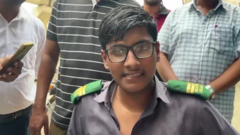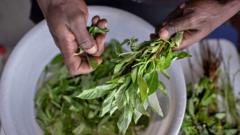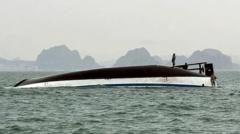The Independent Policing Oversight Authority criticizes Kenyan police for using excessive force amidst a series of protests that resulted in at least 65 fatalities, with authorities facing backlash from rights groups over their handling of civil unrest.
Kenya's Police Accused of Disproportionate Force After Protests Result in 65 Deaths

Kenya's Police Accused of Disproportionate Force After Protests Result in 65 Deaths
A report by Kenya's Independent Policing Oversight Authority reveals police brutality during protests, linking nearly all deaths to law enforcement actions.
Kenya's police watchdog, the Independent Policing Oversight Authority (Ipoa), has released a damning report accusing law enforcement officers of using "disproportionate force" during recent protests that resulted in 65 tragic deaths. The report, published Thursday, attributes the majority of these fatalities to police actions and notes the actions of opportunistic individuals, termed "goons," who disrupted peaceful demonstrations.
In the past six weeks, protests against police brutality and government policies have escalated, with four major events leading to significant violence. The initial protest, held in Nairobi on June 12, was marked as "largely peaceful" but was triggered by the death of a young teacher and blogger, Albert Ojwang, in police custody. His death, initially claimed to be self-inflicted, led to full charges against three police officers for murder.
The second protest on June 17 saw the tragic killing of street vendor Boniface Kariuki by police, further inflaming tensions among the populace. On June 23, demonstrators gathered to commemorate a year since previous anti-government protests, resulting in 23 more deaths that day alone. The most devastating day, July 7, recorded a staggering 41 fatalities.
Throughout these demonstrations, the Ipoa reported a total of 342 civilian injuries alongside 171 injuries to police, alongside occurrences of looting and vandalism. Their investigation underscores serious violations of constitutional policing standards, including excessive force and a failure to respect citizens' rights to peaceful assembly.
In contrast, a police spokesperson refused to comment directly on the Ipoa's findings and redirected inquiries to an Interior Ministry statement, which attributed violence to "criminals" and "anarchists." Following the violent protests, President William Ruto controversially instructed police to shoot rioters in the legs as a tactic to incapacitate rather than kill.
Interior Minister Kipchumba Murkomen denied any excesses by police, claiming that the protests reflected "terrorism disguised as dissent." In light of the escalating violence, human rights organizations have vocally condemned the government's approach, accusing it of promoting and sometimes authorizing lethal force against demonstrators amid calls for accountability and reform.




















